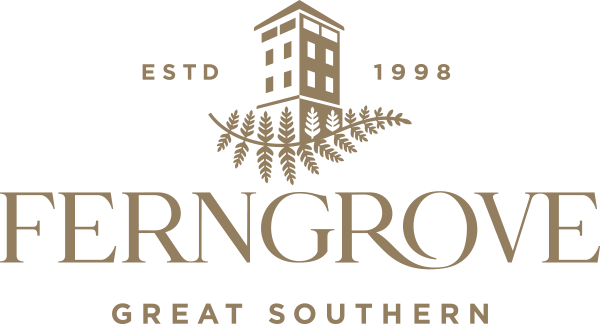Sustainability Commitment

Just over three years ago, Ferngrove made the bold commitment to “lessen the toll on our Earth” and start a journey to become a fully certified and practising member of the Sustainable Winegrowing Australia program across our Frankland River vineyards and winery.
The preeminent national authority “Sustainable Winegrowing Australia’’ administered by the Australian Wine Research Institute is Australia’s national program for grape growers and winemakers who are committed to making sustainable wine. An important industry wide initiative that seeks to improve the sustainable footprint wineries and grape growers.
In 2020, Ferngrove was acknowledged as the first and only winery to accomplish full sustainability in the Great Southern wine region.
At Ferngrove, our commitment to making the best possible wines means that sustainability is at the centre of everything we do. What we now refer to as our Sustainability Stewardship program.
With our sustainability stewardship program, we are committed to reducing our environmental footprint, with a focus on better utilising our natural environment. Our goal is to analyse every aspect of our business and winery practices, ensuring our actions minimise the impact of our activities on the environment. Below are just some of the things we are doing to drive sustainability “stewardship” within our business.
Cover Crops, Composting & Sheep
Our vine rows are sown with wild clover and other foliage called cover crops. This vegetation does multiple jobs. It controls erosion and, at the end of its lifecycle, enriches our soil with nitrogen and other macronutrients. This, combined with our own composting program, allows us to abandon chemical fertilizers.
Over time cover crops add organic material to the soil, a cornerstone of regenerative farming, as it holds and absorbs water and makes the vines more resilient to weather extremes. Cover crops also create a lively habitat for insects, where “good bugs” prey on “bad bugs,” specifically, insects such as spiders and ladybugs naturally control populations of vine-damaging insects such as weevils and sharpshooters. This eliminates the need for insecticides.
Sheep are also used to mow between the vine rows and eliminate use of herbicides.
Rainwater Harvesting
The Great Southern has the World’s most ancient iron-rich laterite soils is a region where the rainfall is meagre.
During the winter we capture rainwater for all our irrigation and winery needs throughout years as well as re-using and recycle all the water we use.
Across 100% of our vineyards, we also use drip irrigation system, which cut overall water usage dramatically.
Water Conservation
We have embraced watering technology in vineyard to allow us to be surgical in our water use. We placed electronically and WIFI connected watering controllers across all our vineyards that monitored water usage, making it more efficient to water vines when needed.
We also collaborate with neighbouring wineries to produce organic mulch utilising grape marc and straw from farmers in surrounding districts and recycled organic waste purchased from local third-party suppliers.
This provides benefits such as improved soil nutrients, enhanced earthworm, and soil microbe activity for healthier soils. It also helps reduce water evaporation of water near the surface.
Solar Power
In 2010 we made the switch to solar power.
We harness large amounts of solar energy through our 250 KW system -we have installed over 700 solar panels to save nearly 50% of electricity usage from traditional power sources, reducing carbon emissions and becoming one of the most environmentally friendly wineries in Australia.
On sunny days our arrays produce, at peak enough power to meet the baseload needs of 50 average Australian homes.
Liquor Licence Number: 6180078139
